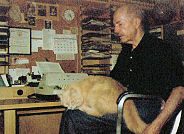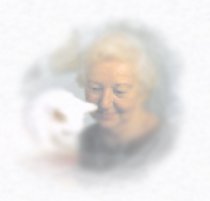Heinlein the Man
by Amy Baxter
Amy Baxter, M.D. is the Heinleins’ ‘Adopted Granddaughter, ‘ a relationship she discussed in depth for the first time on the Heinlein Society site in an article about her medical invention, Buzzy®.
Read Heinleins’ Adopted Granddaughter, Medical Inventor
This piece, “Heinlein the Man,” also appears as the concluding article in the Virginia Edition of the Collected Works of Robert A. Heinlein, available at:
virginiaedition.com
If you could say something about the Heinlein Century – the century influenced by Heinlein’s writing and his advocacy of important issues.
 History progresses in looping Venn diagrams; pendulum swings advance human experience, only to have public opinion retreat to well-trodden behavioral territory. We’re not doomed to repeat history, just culturally more familiar with patterns we know. When works of literature transcend these habitual loops, carrying truths of human nature that are culture-irrelevant, they become classics. The oeuvre of Robert A. Heinlein is classic in scope, relevance, and insight. As we advance into a new century, we could use a little Heinlein right now.
History progresses in looping Venn diagrams; pendulum swings advance human experience, only to have public opinion retreat to well-trodden behavioral territory. We’re not doomed to repeat history, just culturally more familiar with patterns we know. When works of literature transcend these habitual loops, carrying truths of human nature that are culture-irrelevant, they become classics. The oeuvre of Robert A. Heinlein is classic in scope, relevance, and insight. As we advance into a new century, we could use a little Heinlein right now.
‘Classics’ earn the label by resonating differently for different people, and at different life stages. For myself at 11, lying in bed with broken ribs from a near-flying tree climbing incident, no resonance was needed. Devouring the characters and plot of Have Spacesuit, Will Travel got me through a day or two. Expanded Universe added nuance and the eventual entrée I used to enter the Heinlein’s lives. By that time I was completely hooked – – and flying.
What was so giddy about the books to an 11 year old? What fired the imaginations of people who became engineers, scientists, and leaders? Furthermore, what is it about Heinlein’s works that cause us to soothe ourselves with them now when the world insists mediocre is better than best?
Earlier in my life I attributed the draw to intelligent characters triumphing over situations, delighting in the assurance that life is a meritocracy. Small town high school students, runaway country kids, beggars and unappreciated space ship architects – stick with it, kids! Success is as close as hard work and ability!
By the time I was 12, I’d written the Heinleins and asked to be adopted… not because I lacked excellent grandparents, but if you could choose more, who wouldn’t want the Heinleins? In “Inside Intourist” I read Virginia Heinlein’s comment to Russian citizens that they had no children. No children… do the logic… bells going off… means no grandchildren. Hey! “If I’d known how much fun grandchildren would be, I would have had them first.” Who doesn’t want grandchildren? Take big bites! Carrying this burst of reasoning forward, I wrote a letter pitching my offer. They asked exactly what adopting a grandchild entailed, and I said “Accept crudely made presents for birthdays and Christmas, and show my picture to everyone even if they’re not interested.” The merits of this persuasive argument and advantageous arrangement were obvious, and they accepted. The deal was sealed with the time-honored tradition of them sending me a penguin book when they returned from visiting Antarctica, and tacking my picture over the printer. They told a few people, and Granma told me later they figured I’d forget when I hit my teenage years. I did not. In retrospect, the ensuing relationship changed my life. When your hero adopts you at age 12, there’s little that seems out of reach.
I enjoyed the almost exclusively postal relationship during my adolescence, then was broadsided when he died in 1988. A procrastinating college student on a foreign exchange semester, I had been dawdling with an overdue letter when I read the obituary in Time magazine. Grief multiplied by homesickness overwhelmed me, and Granma and I wrote back and forth as fast as we could spill our emotions onto stationery. We finally met in person in 1991, and I was able to see in her reflection the elements of the man who had formed much of my character through his writing.
Great authors distill their introspections and realizations, and pass them in digestible printed nuggets back to upcoming generations. Perhaps they hope to save others the time they spent on the journey, allowing humankind to push the pendulum of progress a bit further. Perhaps, as Heinlein has stated, they just hope to make a buck. Comparing Heinlein’s personal character reflected in his fictional societies to the current culture, one can see what has disappeared. Through knowledge of the man reflected in his characters, I see what I hope humankind picks up on the next pendulum swing back: graciousness, self-reliance, and integrity.
Granma embodied the combination of piercing political savvy coupled with (mostly) nonjudgmental interpersonal grace. This is the first characteristic of the Heinlein oeuvre that I sense has been lost in our current cultural pendulum swing: graciousness. At a dinner, one of Granma’s fan/friends impudently boasted she’d voted for Mickey Mouse in lieu of an acceptable candidate. I was shocked — had she not read “Take Back Your Government”?? Granma was appalled, but her subsequent soliloquy on when and how political representation mattered was carefully combed for barbs before release. Philosophies are hard and pointed, often ill-suited for interpersonal interactions. Instruction, rather than contradiction, was her gracious way of arguing without injuring. Decades later, this same friend went on to drive more than 100 miles daily to visit Granma while she recuperated from a hip fracture.
Graciousness nurtures and lubricates a society; in practice, it may boil down simply to “be kind, and avoid ad hominem attacks.” Spin and soundbites have twisted our nation’s politics into a polarized mockery of debate. Higher education and academic excellence are now “elitism”, and reductionist and slippery slope arguments take the place of clearly laid out policy differences. “You can’t offend an honest man,” Heinlein often wrote: we should have sufficient self knowledge to reject or acknowledge our own character attributes, and deal with that assessment dispassionately. In the culture of media’s current omnipresence, offensive accusations now require rebuttal, drawing time away from real discourse. Failing to rebut equals failure to be elected… democracy is still a system for beginners. While the Heinlein ideal of humans populating the galaxy can’t be realized without ruthless ambition and dedication, our civilization can’t function at its highest level when those of ability are clawed down for irrelevant reasons. Lack of graciousness amongst ourselves is one of Heinlein’s signs of a sick society: fouling our own nest.
While a libertarian and Ayn Rand supporter, Heinlein was not an acolyte. Objectivism allows for pursuit of individual self-actualization and external criticism without a moral responsibility to others. Heinlein’s characters repeatedly tried to support others who weren’t as able, just out of human decency. The instant Friday senses an incoming explosive, she tries to save the annoying, slightly overbearing Sergeant. Characters may scrap to survive independently- Sam stole Max’s guild books in Starman Jones -, but when fellow humans are attacked, they defend each other to the death. Encompassing ambitious autonomy and decency in one persona isn’t really that hard: pull yourself up, don’t push others down. One reason objectivist fan clubs seem to die out is that when faced with disagreements, the objectivist feels their right to their point of view is more important than the survival of the group. Compromise is not possible without graciousness- and is far more pragmatic.
Heinlein once wrote a forward to a book for a fellow science fiction author. The forward was generous and filled with glowing praise, and I hated the book. Years later when I commented on it to Granma, who said, “Oh, yes, he didn’t like the book at all.” Surprised, I went back and re-read the forward. With that knowledge, the forward became a piece of incredible creative prose. Heinlein NEVER said he loved the book… he loved the author. He honored the author, and he did his level best to support a friend and be honest.
It’s written many places, though I have no direct knowledge, that the Heinleins would send interest-free loans to authors and friends stuck in hard times. Stories like these seem quaint today – are they unreported, or not occurring in our society? Perhaps we lack this social fabric because cheap transportation has facilitated lack of community; if you fail in one area, you can always move. Yet the Heinleins lived many places, and their community of science fiction was far flung. Maybe the reason we’re less likely to give is that we don’t trust the government or each other to care for us, necessitating more money to feel secure when we’re in need. Could anyone truly go door to door and get a hand out when hungry today? Or would we call the police to come pick up the vagrant? Caring is not a trait that jumps first when contemplating Heinlein, yet it is the fabric on which his plots, characters, and society hang. Without kindness, without decency, without civility nurturing the society, ambition becomes fractionating and we shall surely hang separately.
Graciousness and decency can become liabilities if they’re not handled with large doses of self-reliance and skepticism. Believing in human beings and the need for good government are different than naïve acceptance of the status quo. Heinlein provided a political barometer and cautionary tales to his times. Beware the theocracy, my son, whose vorpal pre-emptive strikes go snicker-snack. Beware complacency, beware unpreparedness and sloth, beware being caught with your ozone layer down without a suitable planet to offload to and a ready supply of seeds.
In Granma’s apartment in Fleet Landing she displayed some of his numerous awards. The Hugos – sleek, classic cigar-shaped spacecraft—were lined up on the fireplace mantel next to the Bonestell painting. The first ever Grand Master Nebula for lifetime achievement, a miniature Lucite world mounted on a wooden base, was over the bar. (Funny story – Granma wouldn’t drink alone, and rarely used their extensive collection of glassware. After staring at the gathering dust for a few years, one visit my husband Louis Calderon and I decided to clean up that bar. The cleaner we used had some solvent which affected lacquer, and when I reached to move the Nebula to dust under it, THE BASE STUCK TO MY HAND. My fingerprint was affixed to the trophy! I reached to pull it away, and part of the base stuck to my OTHER HAND! Oh, NO! Blasphemy!!!! Fortunately, Granma was unperturbed when I revealed my mistake.) His favorite award, she shared, was, that from the National Rare Blood Club, which was consequently hung in the dining room just outside Granma’s bedroom so she could see it the most often. It’s hard to be self-reliant when you need a transfusion from others. Not content to just research his own rare blood type, he went beyond to champion blood drives, and insist on drives as a perquisite for speaking at conventions.
 Robert Heinlein’s active support of blood donation may be seen as altruistic, or a way to “pay it forward.” I think a deeper appreciation highlights the difference between self-interest and a self-reliance. Rarely can one be self-reliant in a vacuum. Rather than bank his own blood out of self-interest, when he saw a systemic problem with the blood supply, he acted in a way which benefited the community. Both Heinleins eventually needed transfusions to SURVIVE. Good luck, or good planning? Survival requires a skeptical assessment of the systems which sustain life, which is different from global criticism. Heinlein was skeptical about the continuation of the blood supply without intervention, and intervened. Criticism isn’t self reliance; informed action is.
Robert Heinlein’s active support of blood donation may be seen as altruistic, or a way to “pay it forward.” I think a deeper appreciation highlights the difference between self-interest and a self-reliance. Rarely can one be self-reliant in a vacuum. Rather than bank his own blood out of self-interest, when he saw a systemic problem with the blood supply, he acted in a way which benefited the community. Both Heinleins eventually needed transfusions to SURVIVE. Good luck, or good planning? Survival requires a skeptical assessment of the systems which sustain life, which is different from global criticism. Heinlein was skeptical about the continuation of the blood supply without intervention, and intervened. Criticism isn’t self reliance; informed action is.
The Heinleins were very proactive about individual and species survival, which fueled their interest in… everything. Knowledge and opinions fuel skill acquisition and action.
Finally, the most profound Heinlein theme, or perhaps the fabric on which his worlds and futures are painted, is integrity. Heinlein broadcast that you pay your dues, you stand up and be counted, you take your just punishment with chagrin but no lip, and you play the hand you are dealt. The pleasure of service and duty without compromising honesty often preceded the plot twist. (“That record is false from start to finish,” Max said miserably, before being given a shot at astrogator. ) “No conscientious officer lets himself be relieved until his board is all green.” This integrity is the base line to all Heinlein stories, and is a tune that is hard to hear in today’s works. Reflected in the Edward R. Murrow “This I believe” essay written in 1952 and read by Grandma Heinlein later, this value tied us to the future and the stars in a way no other author has captured.
“I believe in the honest craft of workmen. Take a look around you. There never were enough bosses to check up on all that work… things were built level and square by craftsmen who were honest in their bones.”
Where would our society be now if this degree of personal integrity was still expected? If defense attorneys argued their best, but let the jury’s decision stand rather than appealing as a matter of lucrative habit? Where would we be if CEO’s stood by their performances, rather than manipulating stock values to maximize benefit packages when they retired. What would happen to healthcare if services rendered were paid rather than denied on an algorithm of returns, if lawsuits remedied malice rather than chance, and if tests were tailored to patients rather than a theoretical defense stand?
Edward Tufte, an expert in efficient presentation of data, details in his book Beautiful Evidence just exactly how failure to communicate honestly led to the deaths of the Columbia astronauts. To whom are we responsible, if not ourselves and each other? Heinlein’s characters assumed a communal and individual responsibility that many in our culture have ceded. “No man can own a thing to himself alone, and the bigger it is, the less he owns it. You are not free to deal with this property arbitrarily nor foolishly. Your interest does not override that of other stockholders, nor of employees, nor of the public.”
 Edith Stone cemented my desire to become a physician in The Rolling Stones: when an adjacent spaceship needed medical care, there was never an instant where she considered other than going to help. Vicariously I felt the clarity, privilege and honor of duty. I’m still truly happy to make house calls for anyone who needs me, in spite of malpractice risks… because it’s the right thing to do. Serving is the privilege and a great part of the pleasure of the position. Heinlein taught me that.
Edith Stone cemented my desire to become a physician in The Rolling Stones: when an adjacent spaceship needed medical care, there was never an instant where she considered other than going to help. Vicariously I felt the clarity, privilege and honor of duty. I’m still truly happy to make house calls for anyone who needs me, in spite of malpractice risks… because it’s the right thing to do. Serving is the privilege and a great part of the pleasure of the position. Heinlein taught me that.
I realize these views may be responding to a fad; perhaps cynicism is more stylish than trust, and ad hominem attacks get press while nobility does not. What I see lacking in today’s world, though, is this honest craftsman integrity. For four decades, physicians have been told never to apologize or admit fault for fear of lawsuit repercussions. How did this perversion arise? Characters in Heinlein books were able to perform accurate self appraisals, meting out self-judgments naturally. They made promises (“Yes, mother thing, I’ll set the beacon!)” and kept them or died trying. Arguing out of a tight spot was rarely as valued as standing tall, acknowledging an error, and moving forward. People did not appeal and appeal; justice was swift, the Martha Stewarts held their heads high, took their punishment without arguing that the other fellows deserved it more, and moved on. Reassessing information and learning is now “flip-flopping”, and politicians never admit fault.
 Heinlein’s take on integrity extended to human relationships, real and fictional. His strong fictional female characters reflected his strong, unbelievably educated wife. When interviewed on the night of the lunar landing, he made female equality in space a centerpiece discussion. No matter how varied his combinations of fictional human coupling got, honesty and concern for others’ feelings always obviated the need for jealousy. When Friday realized her flirtation target was married, she stood down until the wife weighed in. (As an aside, I once saw Granma Heinlein inexplicably stuff a beautiful set of tea towels far into the back of a drawer. When I questioned her emotional treatment of the linens, she exclaimed “They were from a female fan who wanted to sleep with Robert!” “Well, you must see where someone could get that idea….” I began tentatively. “Amy!” she sniffed, primly appalled. “That sort of stuff is to sell books.”)
Heinlein’s take on integrity extended to human relationships, real and fictional. His strong fictional female characters reflected his strong, unbelievably educated wife. When interviewed on the night of the lunar landing, he made female equality in space a centerpiece discussion. No matter how varied his combinations of fictional human coupling got, honesty and concern for others’ feelings always obviated the need for jealousy. When Friday realized her flirtation target was married, she stood down until the wife weighed in. (As an aside, I once saw Granma Heinlein inexplicably stuff a beautiful set of tea towels far into the back of a drawer. When I questioned her emotional treatment of the linens, she exclaimed “They were from a female fan who wanted to sleep with Robert!” “Well, you must see where someone could get that idea….” I began tentatively. “Amy!” she sniffed, primly appalled. “That sort of stuff is to sell books.”)
I’m glad he DID write and sell those books, and that through having them available at an impressionable time I learned the values of graciousness, self-reliance, and integrity. To be sure, other values came through as well… Friday, Farnham’s Freehold, and Time Enough for Love gave me a foundation for tolerance and open-mindedness, and exposed the subtle ways bigotry can erode a society. Heinlein’s entire oeuvre sang the joy that comes from working hard for a good cause, without being cautious or tentative. ‘To enjoy life, take big bites: moderation is for monks.” “The secret to a long life is to have a purpose that outlives you.”
We recently celebrated the 100th anniversary of Heinlein’s birth. Granma loved the concept of “Heinlein’s Children,” and delighted in (and answered) thousands of letters from engineers, physicists, scientists, and teachers who all had a story about the influence of Robert’s works. Heinlein would have had us pay our gratitude forward by helping someone else who needs it: volunteering at a school, giving blood, finding a renewable source of energy. You’re already doing those kinds of things… but it would help incite interest in the man and his values if you get your children reading the books. Be on the lookout for self-serving rhetoric disguised as “self-reliance,” and support an integrity that is both personal and community-based. Heinlein stated that “politics is the only game for grown-ups.” Set an example, be skeptical, but be involved. Above all, be gracious, and remember the effect one person writing entertaining science fiction can have. We could use a little Heinlein for our next century.



